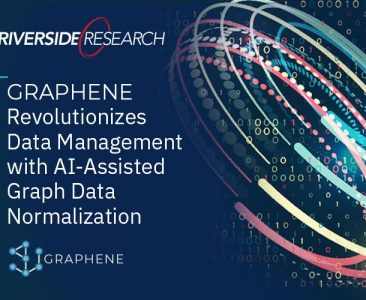Riverside Research’s Graphene Software Revolutionizes Data Management with AI-Assisted Graph Data Normalization
Author(s): Chad Korbecki, Tara Clapper
In the landscape of data management, the need for accuracy, efficiency, and seamless collaboration is critical. Graphene is a groundbreaking AI-assisted graph data normalization tool set to transform the way organizations handle their data.

Graphene significantly enhances data accuracy and integrity. This innovative system is designed to automatically scan and reconcile graph databases, identifying and resolving duplicate nodes, relationships, and conflicting information. By doing so, Graphene empowers users, including analysts, researchers, developers, and decision-makers within the Department of Defense (DoD) and Intelligence Community (IC) to maintain high-quality data with minimal need for manual intervention.
How Riverside Research’s Graphene Improves Graph Databases
Disconnected data nodes, manual reconciliation processes, and underutilization of graph database capabilities create room for problems and lack of standardization. These issues are particularly pronounced for smaller or underfunded teams, leading to diminished data quality and inequities in data management.
Graphene addresses these challenges by integrating mature, open-source tools with advanced AI models. The system performs entity normalization and resolution, uncovering hidden patterns and streamlining workflows.
Graphene is a module that normalizes and reconciles relationships between edges and nodes in graph databases.
In databases, duplication of objects and nodes becomes problematic and adds to query time. Riverside Research’s Graphene deduplicates the data in objects and nodes, reducing query time as a result.
Deduplication Example
Let’s say a report examines data about the USAF’s F-47 aircraft. However, users have entered data about the model of the same plan in the database in multiple ways:
- F-47
- F47
- Boeing F-47
- Boeing F47
Graphene would recognize that all four variations are describing the same aircraft. It would reconcile the discrepancies then list them all as the user-preferred name on the final report. Graphene prompts government entities and organizations to find common ways to describe each project, system, or piece of equipment.
Visualization Data Standardization and Data Variety
Graphene also standardizes the visualization of data, so chart-by-chart comparisons make more sense and take less time to configure. Graphene can work with a variety of inputs, including technical documentation, social media data, graph databases, and internal large language models (LLMs).
In each of these examples, users enter data in non-standardized ways. On social media, for example, scraped data could include thousands of posts from social media users all over the world, even in different languages. Graphene is the key to reconciling this data and generating consistent reports, often integral to language analysis and threat assessment.
Graphene can export a graph database in a machine-readable JSON format, adhering to the normalization of this practice. Users can also re-integrate their reports into their databases, and Graphene’s AI will normalize data and re-integrate it into the database.
Graphene Showcases Secure Offline Access and User-Friendly Interface
Graphene currently operates in a closed model, assuming most users want to keep data offline and secure. While most users prefer secure offline access, it is possible to connect Graphene to a cloud environment. The interface is designed to be intuitive and user-friendly, making it accessible for junior-level analysts and other team members to interface with the program.
Graphene: A Product of Riverside Research’s IRAD Program
Riverside Research reinvests in their technology with specific Internal Research and Development (IRAD) projects focused on solving problems for customers. With the Graphene IRAD, Software Applications Team Lead, Chad Korbecki, and his team aimed to make data standardization easier for government customers struggling with this issue.
Graphene can establish efficiency and normalize reporting methods for your team while measurably improving situational awareness. Interested in integrating Graphene as a solution in your operations? Riverside Research’s mission-focused mindset can make it happen.
Learn more about Graphene
Featured Riverside Research Author(s)
Chad Korbecki
LinkedIN
Tara Clapper
Tara Clapper is a marketing strategist and content creator at Riverside Research. Her professional background includes technical writing, social media management, publishing, marketing, editorial duties, analog game design, prompt engineering, and content management in govcon, academic, and private sector spaces. Tara helps tell the Riverside Research story by interviewing SMEs for blogs, press releases, and social media channels. Tara holds a Bachelor of the Arts in English from McDaniel College.
LinkedIN
The above listed authors are current or former employees of Riverside Research. Authors affiliated with other institutions are listed on the full paper. It is the responsibility of the author to list material disclosures in each paper, where applicable – they are not listed here. This academic papers directory is published in accordance with federal guidance to make public and available academic research funded by the federal government.
